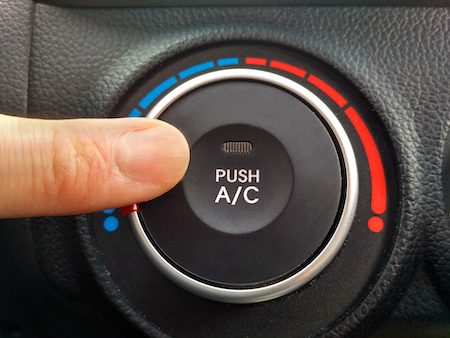The seasons are changing. Summer is a short time away.
Before you know it, the temperatures will be climbing up, up, up.
Will your car’s air conditioning system be ready for the challenge? Performing a little TLC now will help maintain your car’s air conditioning system no matter what the weather is like outside.
Your car’s cabin can reach as much as 140 degrees on the hottest days of the year. If you want your AC system to work no matter what the thermometer reads, you’ll have to add a maintenance visit to your regular routine.
Understanding a car’s air conditioning system
The air conditioning system in a car is responsible for cooling and dehumidifying the air inside the cabin. The basic components of a car’s AC system include:
- The compressor is the heart of the AC system. It is driven by a belt from the engine, which compresses the refrigerant gas and circulates it through the system.
- The condenser is located at the front of the car and releases heat from the compressed refrigerant gas. It looks like a small radiator and has fins to dissipate heat.
- The evaporator is inside the car’s cabin, typically behind the dashboard. It absorbs the heat from the air inside the vehicle, causing the refrigerant to evaporate and turn into a gas.
- The expansion valve or orifice tube is a small component between the evaporator and the compressor. It controls the flow of refrigerant into the evaporator.
The air conditioning system compresses the refrigerant gas in the compressor and then circulates it through the system. As the compressed gas moves through the condenser, it releases heat and becomes a high-pressure liquid. The liquid then flows through the expansion valve or orifice tube, which lowers its pressure and causes it to evaporate as it passes through the evaporator. The evaporating fluid absorbs the heat from the air inside the cabin, which is then blown out through the car’s vents.
The system is closed and continuously circulates the refrigerant gas, which means that a low refrigerant level or a malfunctioning component can reduce cooling efficiency or cause a system failure. Regular maintenance and servicing can ensure the proper functioning of the AC system.
How do you know if your car’s air conditioner is failing?
Several signs can indicate a failing AC system in a car. The most common include:
Reduced cooling performance – If your car’s AC system is no longer cooling the cabin as effectively as it used to, this can be a sign of a problem. The air from the vents may feel warm or not as cool as it should be.
Strange noises – Unusual sounds from the AC system, such as grinding, hissing, or rattling, can indicate a problem. A malfunctioning compressor or other components can cause these noises.
Foul odors – If you notice a bad or musty smell from the AC system, this can be a sign of mold or bacteria growth in the evaporator. This can also cause health problems if left untreated.
Water leaks – If you see water leaking from the AC system, this can indicate a clogged drain tube or a malfunctioning evaporator.
AC system not turning on – If the AC system fails to turn on, this can be caused by a blown fuse, a faulty compressor, or an electrical problem.
If you notice any of these signs, it is vital to have the AC system checked by a qualified mechanic. Ignoring these issues can lead to further damage to the AC system and higher repair costs.
What regular maintenance items should you do to keep the air conditioner operating well?
Nothing is worse than being surprised with an air conditioner that suddenly doesn’t seem to work on the hottest day of the year. To avoid this, stick with a regular maintenance schedule to ensure its proper functioning and prevent issues from arising.
Change the cabin air filter – The cabin air filter helps prevent dust, pollen, and other debris from entering the cabin and clogging the AC system. A dirty or clogged cabin air filter can reduce the airflow and cooling efficiency of the AC system. Changing the cabin air filter every 12,000 to 15,000 miles or once a year is recommended.
Inspect the belts and hoses – The belts and hoses in the AC system can wear out over time and develop cracks or leaks. Regular inspection can help detect any issues before they cause significant problems.
Check the refrigerant level – The refrigerant is the substance that cools the air in the AC system. A low refrigerant level can reduce the cooling performance and cause the compressor to overwork. It is recommended to check the refrigerant level every 12,000 to 24,000 miles or every two years.
Clean the condenser – The condenser can become clogged with dirt, debris, and bugs, reducing its ability to release heat from the refrigerant. Regular cleaning with a soft brush or compressed air can help maintain efficiency.
Run the AC system regularly – Running the AC system regularly can help keep the system lubricated and prevent the seals from drying out.
Have the AC system serviced regularly – Have the AC system inspected and serviced by a qualified mechanic every two years or as the manufacturer recommends.
Is your air conditioner ready for the summer season?
Regular maintenance and servicing of the AC system can help prevent any of these problems from occurring in the first place. It’s the best way to ensure your vehicle is ready for whatever Colorado weather dishes out.
When was the last time you had your air conditioner inspected?
Get ready for the summer – book your maintenance visit now.

